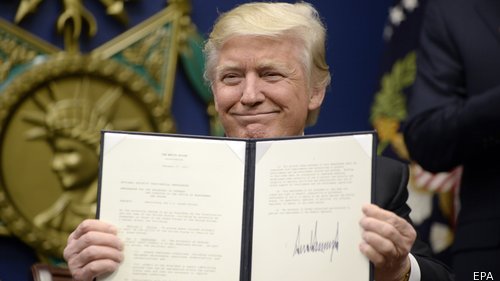Trump closes door to refugees, visitors from seven nations
Sat 28 Jan 2017, 13:28:11

President Donald Trump has put a four-month hold on allowing refugees into the United States and temporarily barred travellers from Syria and six other Muslim-majority countries, saying the moves would help protect Americans from terrorist attacks.
In the most sweeping use of his presidential powers since taking office a week ago, Mr Trump paused the entry of people from Syria and the six other nations for at least 90 days, saying his administration needed time to develop more stringent screening processes for refugees, immigrants and visitors.
"I'm establishing new vetting measures to keep radical Islamic terrorists out of the United States of America. Don't want them here," Mr Trump said earlier yesterday at the Pentagon.
"We only want to admit those into our country who will support our country and love deeply our people," he said.
The order seeks to prioritise refugees fleeing religious persecution, a move Mr Trump separately said was aimed at helping Christians in Syria. That led some legal experts to question whether the order was constitutional.
One group said it would announce a court challenge on Monday. The Council on American-Islamic Relations said the order targets Muslims because of their faith, contravening the US Constitutional right to freedom of religion.
"President Trump has cloaked what is a discriminatory banagainst nationals of Muslim countries under the banner of national security," said Greg Chen of the American Immigration Lawyers Association.
The bans, though temporary, took effect immediately, causing havoc and confusion for would-be travellers with passports from Iran, Iraq, Libya, Somalia, Sudan, Syria and Yemen.
Mr Trump has long pledged to take this kind of action, making it a prominent feature of his campaign for the 8 November election, but people who work with Muslim immigrants and refugees were scrambling to determine the scope of the order.
Even legal permanent residents - people with "green cards" allowing them to live and work in the United States - were being advised to consult immigration lawyers before travelling outside the country, or trying to return, said Muslim Advocates, a civil rights group in Washington.
During his campaign, Mr Trump tapped into American fears about so-called Islamic State militants and the flood of migrants into Europe from Syria's civil war, saying refugees could be a "Trojan horse" that allowed
attackers to enter the United States.
attackers to enter the United States.
In December 2015, he called for a ban on all Muslims entering the United States, drawing fire for suggesting a religious test for immigrants that critics said would violate the US Constitution.
His idea later evolved into a proposal for "extreme vetting."
Mr Trump's order also suspends the Syrian refugee program until further notice, and will eventually give priority to minority religious groups fleeing persecution.
Mr Trump said in an interview with the Christian Broadcasting Network that the exception would help Syrian Christians fleeing the civil war there.
Legal experts were divided on whether this order would beconstitutional.
Mr Trump's order had been expected to include a directive about setting up "safe zones" for Syrian refugees inside the country, but no such language was included yesterday.
The order may also affect special refugee programs for Iraqis who worked for the US government as translators after the 2003 invasion of Iraq.
Democrats were quick to condemn Mr Trump's order as un-American, saying it would tarnish the reputation of the United States as a land that welcomes immigrants.
"Today's executive order from President Trump is more about extreme xenophobia than extreme vetting," said Democratic Senator Edward Markey in a statement.
Some Republicans praised the move. Representative Bob Goodlatte, chairman of the House of Representatives Judiciary Committee, said so-called Islamic State has threatened to use the US immigration system, making it important to do more screening.
"I am pleased that President Trump is using the tools granted to him by Congress and the power granted by theConstitution to help keep America safe and ensure we know who isentering the United States," Mr Goodlatte said in a statement.
Republican Speaker Paul Ryan, who had panned Mr Trump's original campaign pledge to ban Muslims from entering the United States, expressed some support yesterday.
"We are a compassionate nation, and I support the refugee resettlement program, but it's time to reevaluate and strengthen the visa vetting process," Mr Ryan said.
"President Trump is right to make sure we are doing everything possible to know exactly who is entering our country," Mr Ryan said.
No Comments For This Post, Be first to write a Comment.
Most viewed from International
Most viewed from World
AIMIM News
Latest Urdu News
Most Viewed
May 26, 2020
Do you think Canada-India relations will improve under New PM Mark Carney?
Latest Videos View All
Like Us
Home
About Us
Advertise With Us
All Polls
Epaper Archives
Privacy Policy
Contact Us
Download Etemaad App
© 2025 Etemaad Daily News, All Rights Reserved.



.jpg)






.jpg)
.jpg)








.jpg)
.jpg)
.jpg)
.jpg)
.jpg)

















